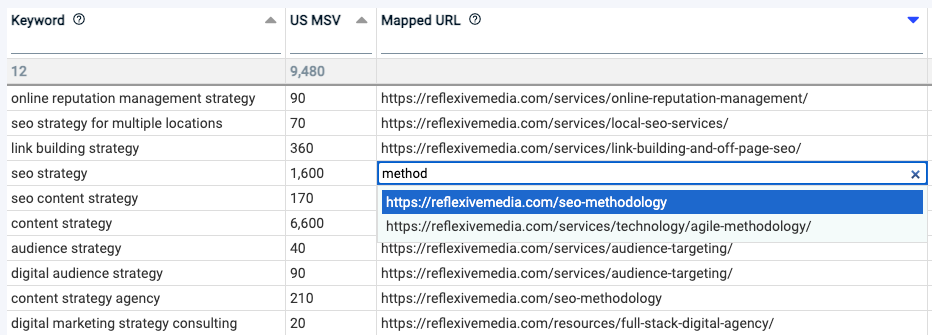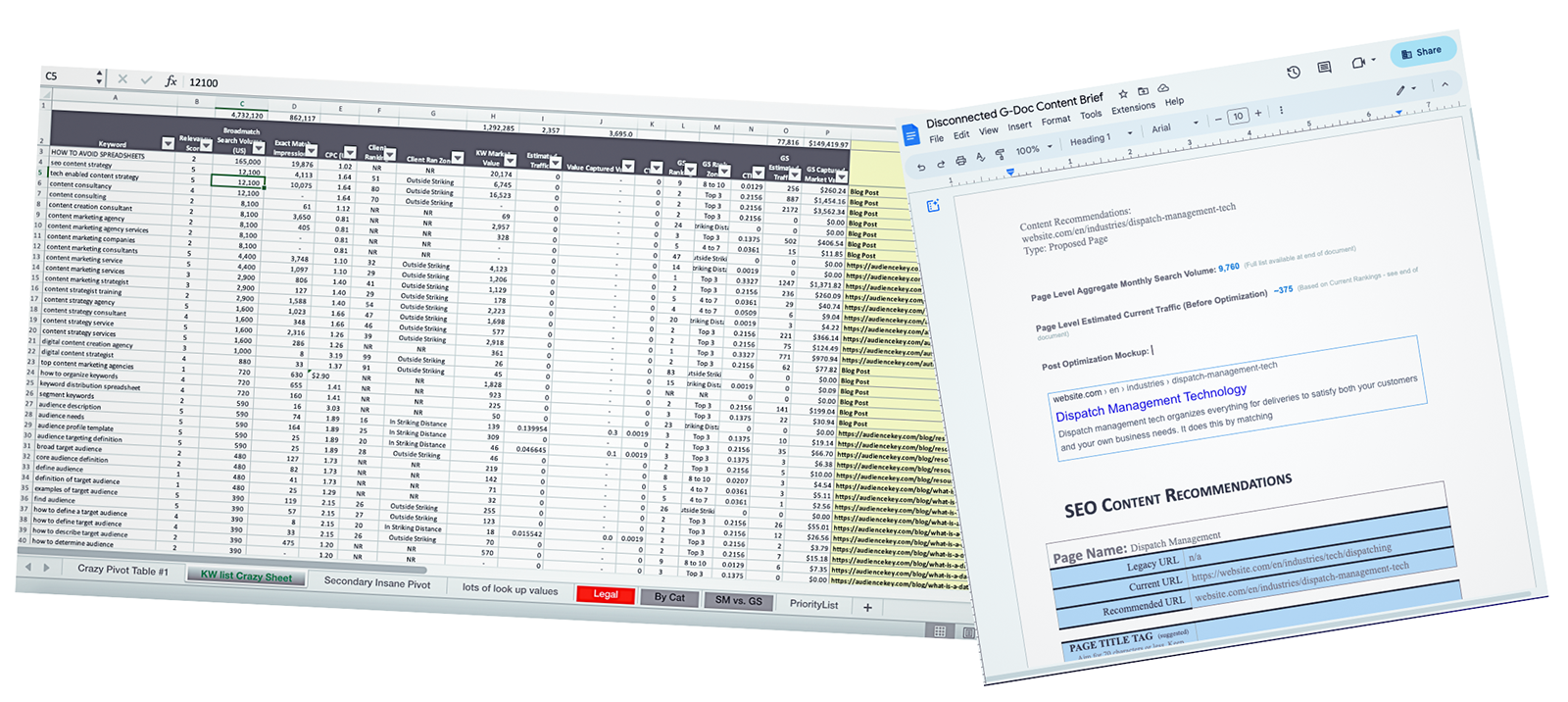REFLEXIVE’S UNIQUE METHODOLOGY TO WIN THE SEO BATTLE
SEO is competitive. SEO is a zero sum game. Increasing your rankings means taking a position over from a competitor. You have to do things differently, smarter, and better than the competition. That’s the definition of STRATEGY.
DISCOVER REFLEXIVE’S UNFAIR STRATEGIC ADVANTAGE
Audience Key: Tech Enablement for SEO Strategy

Over the past five years the Reflexive team has developed, battled tested, and used Audience Key, a system built to support the end-to-end processes of turning upfront SEO research data into an actionable strategic program.
SEO planning, content creation, publishing and performance measurement all come together into one centralized, connected system. To date, with Audience Key, Reflexive has optimized for over one million keywords and optimized tens of thousands of pages. In this process, our core team of strategists have logged their ‘ten thousand hours’, developing world class skills in keyword research, keyword mapping, taxonomy building, and content optimization.
Our unmatched strategy system, put in the hands of veteran strategists, creates SEO programs that are intelligent, differentied, and effective.
HOW IS REFLEXIVE DIFFERENT?
- The creators of Audience Key – a powerful SEO strategy technology
- Conducted by veteran marketers
- Armed with a highly differentiated, proven process seven years in the making





Keyword Research
An exhaustive exploration of all the ways your addressable audience searches for information

Benchmarking & Analysis
Ranking analysis of your site and competitors to determine and quantify growth opportunities

Keyword Mapping
Assign each relevant term to a specific page, existing or planned for the future, to inform your content strategy roadmap

Content Creation / Optimization
Assess and improve content to support how your audience searches, discovers, and consumes content

Measurement & Performance Assessment
Weekly tracking of your SEO performance, progressive ranking growth, and KPI tracking

Building the Database of Intentions for Your Target Audience
At the heart of our unique search engine optimization process, Reflexive begins by developing a custom Audience Key account. Audience Key’s technology metamorphosizes keyword research data into a well organized database of intentions, designed to deliver content to your audience at every stage of their customer journey.
Audience Key facilitates Reflexive to:
1. Quantify and document a spectrum of SEO content opportunities
2. Craft a holistic content architecture plan and site taxonomy
3. Provide a data driven guide for content (re)development
4. Derive performance measurement and growth reporting insights from conducted activities
5. Create feedback loops to identify re-optimization opportunities
Audience Key also provides guidance in determining whether a new page concept is likely to (unintentionally) cannibalize and blur the rankings of an existing page. Our process allows optimization recommendations to account not just for decisions INSIDE a particular page, but to also make optimization decisions ACROSS an entire corpus of pages. Effective SEO strategy MUST take ALL PAGES into account in order to optimize EACH PAGE correctly.
Content Strategy Based on Your Audience’s Search Behavior Data
The Audience Key Building Process
Reflexive begins by collecting and organizing a large database of keyword search intentions focused on your addressable audience. We leverage cutting edge tools and apply proven approaches to establish and quantify how your audience asks questions, searches for information, compares, evaluates, selects, and consumes.
Our multilayered process utilizes an amalgamation of data sources. We analyze rankings for you and key competitors, and layer in extensive topic level research. Ultimately, thousands (and often tens of thousands) of keyword phrases are assembled, scored, and entered into our system.
Keywords are assessed against a multitude of attribution points and metrics. A rankings benchmark identifies current successes and missing opportunity gaps. The result is a customized database of intentions for your addressable audience, with a quantifiable understanding of your site’s current search coverage, and its unrealized SEO potential.
With a thorough discovery process completed, making data actionable is where the rubber meets the road…
Turning Data into Action with Keyword Mapping
If you are not ardently following a keyword mapping process, your SEO approach is suboptimal. Your keyword research is a waste of time.
Here’s the executive summary
- Keyword mapping is essential for maximizing an SEO outcome.
- Without technology built expressly for the process, keyword mapping can be an arduous and difficult process to properly conduct and maintain.
- The huge majority of SEO practitioners do not effectively adhere to a keyword mapping process, if they even attempt to do it at all.
So, What Is Keyword Mapping?
Foundational to a solid SEO method, keyword mapping is the process of assigning each target phrase on your keyword research list to a specific page on your website. The mapped target can be a page currently published, or a page planned for future creation. Keyword mapping is core to any serious SEO strategic endeavor.
What is the best approach for building a long term SEO strategy?
- Find every single relevant keyword phrase possible.
- Plan for which explicit page (current or future) will support each and every target term.
- Use the mapped keyword data to inform optimal content decisions.
- Measure the results and compare disconnects between your mapping ideal and your ranking reality.
- Follow the re-optimization cycle: remap, re-optimize content and re-measure.
This is how a comprehensive SEO strategy comes to life. Every keyword belongs to a page… Every page has a plan and a purpose. Your plan is presented in clear, highly organized, quantifiable terms. Clarity of what we are doing, why we are doing it, and how it is working provides confidence in your investment.
Foundational Rules & Principles for Keyword Mapping Success
The golden rule in SEO is: For any competitive keyword term, only ONE page on a site will rank effectively.
Blurring: having more than one page optimized around a term makes it unclear to search engines which is the right page to potentially rank. Two or more internal pages competing for the same keyword creates blurring, which weakens the ranking effectiveness of each page in question.
Adhering to the keyword mapping process means making clear choices upfront regarding which specific page should be crafted around a cluster of terms. Keyword mapping brings to the surface situations where multiple pages are destined to compete with each other, and how to avoid blurring conflict.
Content Gaps: The other side of the coin from blurring is content gaps, which is when a cluster of topic keywords lack a page to support them. Mapping these keywords to future pages is the formation of an SEO content plan. Comprehensive keyword research in conjunction with mapping = a comprehensive content roadmap.
Keyword Research Data is Market Research for Content Creators: Mapping a set of keywords to a page informs content creators how their target audience is ACTUALLY searching and looking for information. The purpose IS NOT to stuff keywords into content. The purpose IS to speak to the way an audience looks for information and to inspire content that resonates. Doing so leads to better user experience, and increases the chances that visitors will dwell, consume, and convert.
Aligning Upfront Keyword Mapping with Rank Tracking:
- The mapped URL is the ideal page for a keyword.
- The ranking URL is Google’s reality at a point in time.
- It is common that the mapped page and the ranking page are different URLs!
When a keyword’s mapped URL and ranking URL differ, this is a clear signal of a blurring problem. Having this disparity clearly presented and discernable is the only way to identify and solve for this disconnect.
Review and Update Keyword Mapping Regularly: Mapping is an ongoing, iterative process. After mapping and optimizing pages, let time elapse (4-8 weeks generally) and then analyze which terms are progressing, and which terms are not. This begets the re-optimization process. Re-optimization takes two forms:
- Further optimizing, updating, and adding content to the currently mapped page
- Remapping underperforming keywords to a newly planned more granularly focused page
Keyword Mapping With Audience Key

The structured format of Audience Key data allows Reflexive to slice and dice customer search behavior in myriad ways. Once data is assembled and organized, a thorough keyword-to-content mapping process is conducted. Relevant keywords are mapped to a designated URL (either existing or proposed).
This is where the magic of the technology shines. Our system is built entirely around making this process fast and clear.
Keyword attribution technology makes filtering, clustering, and updating keyword mapping fast and easy. Adding new keywords takes seconds. The system blocks keyword duplication and alerts users to unintentional remapping conflicts. URL management intersects with the keyword mapping, so organizing keyword mapping by page type, section, or publishing status is effortless.
A fully mapped Audience Key allows opportunities for content optimization and expansion to become lucid; the pathway forward crystallizes. Your Audience Key account is leveraged throughout our engagement to provide recommendations and prioritizations for content optimization, new content development, and off-page link development targeting choices.
Audience Key automatically produces page-level content briefs (CB) for each mapped URL. Our ongoing page-by-page data-driven process produces an ever-expanding portfolio of content opportunities designed around the way a target audience searches and connects with content.
Content briefs serve as a central collaboration point for strategists (prewriting), writers, editors, and program stakeholders. We approach keyword research as market research for content marketing. The presented data help content creators get into the headspace of their audience, leading to powerful insights and decisions on how to effectively articulate their content.
Key data points and information are present for each step of the content planning, creation, and measurement processes, including:
- Keyword target phrases with monthly search volume and relevancy scoring
- Title tag and meta description optimization
- Natural language processing feedback on how well content aligns with the keyword strategy
- Statuses, team assignability, and target dates for workflow support
- Current keyword ranking and SERP data
- Visibility and ranking changes for your site and key competitor sites
- Progress reporting: ranking visibility growth against your own benchmark and relative growth vs. key competitors
- Ranking URL blurring: when multiple URLs may be competing unintentionally for the same keyword clusters over time
- Ranking URL mismatches: ranking URL does not match the strategic mapped URL
- Updated SERP features associated with each keyword

Who’s Creating the Content?
Our services are flexible around your needs. We can work with your internal writing and editing resources, or our team can fuel content development.
WITHOUT DEDICATED TECHNOLOGY KEYWORD MAPPING IS HARD

Here’s Why SEO Practitioners Commonly Don’t (Effectively) Practice It
- Lack of know-how: Most practitioners lack the experience to know how to effectively conduct the keyword mapping process.
- Spreadsheet hell: At best, teams are doing a form of keyword mapping in spreadsheets — and most often these spreadsheets are not well structured and lack connectivity to the creation and measurement processes.
- Lack of tech: Without software, the keyword mapping process and data upkeep process are overwhelming (but with dedicated software it’s very doable!)
- Siloed data: Keyword mapping data contained in a disconnected spreadsheet is not front and center in the content optimization process — so the mapping strategy has less beneficial effect on being actionable to the process.
Disconnected data: Spreadsheets, word documents, and rank reporting tools are fundamentally disconnected, requiring time for basic data upkeep and organizing to be too hard for teams to manage and scale the process effectively.
Questions to Ask Your SEO Agency or Digital Marketing Consultant
While we at Reflexive are confident that the incredibly thorough and effective services we provide are the right option for you, shopping around and comparing digital marketing service provider options is something that should always be done.
As outlined on this page, your solution provider should incorporate keyword mapping at the core of their strategic services. Below are questions you can ask any prospective SEO service provider regarding how they build, organize, implement and measure the SEO strategy process they plan to provide you.
In planning our SEO strategy, do you practice keyword mapping?
Consider: If they do not subscribe to this methodology, probe to find out why not, and be sure they have a really solid reason (Let us know what it is; we can’t think of one!).
What do you use to organize, manage, and document your keyword mapping?
Consider: It’s possible to do this in spreadsheets, but as this process becomes more complex and data-rich, the spreadsheets can become overwhelming to agency and client members alike. Furthermore, when your keyword map exists in a spreadsheet it’s disconnected from your content and your reporting.
How is your keyword mapping strategy integrated into your content creation and content optimization process?
Consider: Look for how the data is brought into the process front and center
How many keywords should be used to inform page-level content optimization?
Consider: There’s no exact right number, but the wrong answer is anything less than five.
How do you monitor for disconnects between mapped URLs and ranking URLs?
Consider: They should know why this is important, and speak to an established process for dealing with this issue.
How do you approach optimizing a page?
Consider: Look for a substantive answer that shows a procedure and what specific elements are taken into consideration.
How do you monitor and measure the effectiveness of a page optimization?
Consider: Effective answers cover baselining, a clear view of the page before and after, and clear tracking of results before and after change implementation.
How do you report and communicate this progress?
Consider: What tools and systems are tracking, and how this is being communicated and presented in an easy to consume format. Also ask how often this reporting occurs. Do you have to wait until the end of the month, or is the feedback more real time?
What is your process for updating your keyword mapping strategy so that it informs appropriate changes to all pages affected by these changes (the ripple effect)
Consider: Changing mapping decisions from a spreadsheet for instance may not trigger updates to other strategic components such as content briefs and reports. If every change requires manually updates in multiple places, your project is highly subject to the laws of entropy.
Audience Key is Available as a Standalone Option
Relationships are important, and perhaps you want to stick with your current service provider, but they don’t have an effective tech enabled process to satisfactorily answer the above questions. Audience Key is now available for license by you or your service provider of choice.

